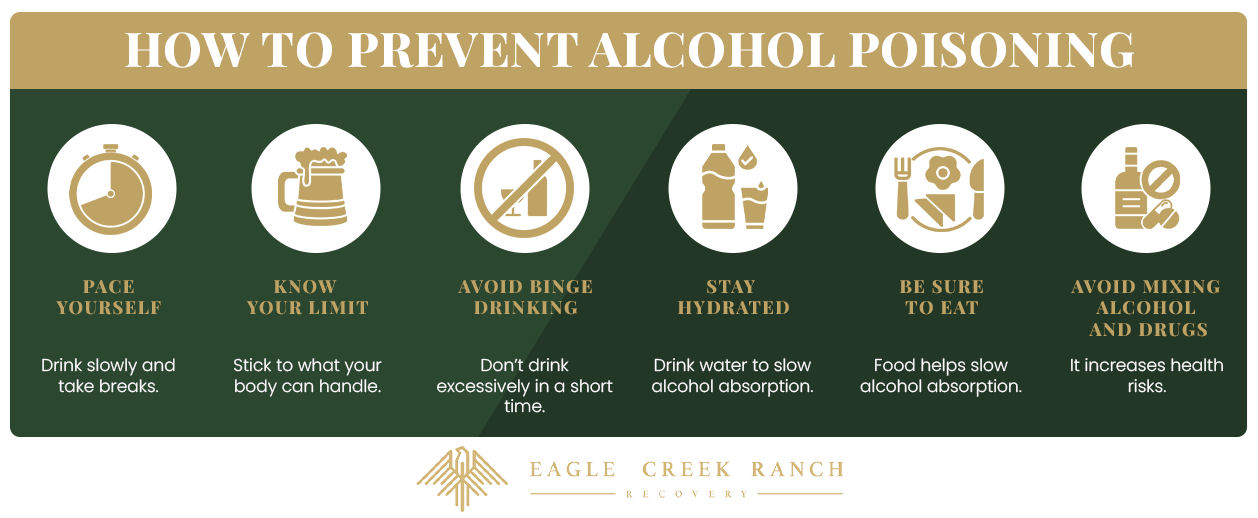How to Prevent Alcohol Poisoning
Drinks after work on a Friday. Drinking by the pool on the weekend. Celebrating a 21st birthday at the bar. All of these are commonplace in our society.
While drinking in moderation can be okay, drinking a little too much might leave you with a hangover. But if you don’t know when to stop drinking, it could be life-threatening. Excessive alcohol consumption can cause alcohol to enter the bloodstream at dangerous levels, greatly increasing the risk of alcohol poisoning. The higher the blood alcohol level, the higher the risk of alcohol poisoning. It’s important to learn the signs of drinking too much and how to prevent alcohol poisoning.
Alcohol poisoning can happen after drinking a large amount of alcohol, typically in a short amount of time. Consuming large quantities of alcoholic drinks, especially hard liquor, during binge drinking episodes significantly increases the risk.
When a person’s blood alcohol level gets so high, it becomes toxic, and the body can no longer function normally. A person may become extremely confused, unresponsive, disoriented, take shallow breaths, pass out, or go into a coma. Alcohol poisoning can be life-threatening and is considered a medical emergency that requires urgent medical attention.
Drinking heavily is a common cause of alcohol poisoning. But it can also happen if someone intentionally or unintentionally drinks household products that contain alcohol. Knowing how to prevent alcohol poisoning begins with understanding who’s at risk, the risk factors involved, what causes it, and the symptoms of alcohol poisoning.
Contact Eagle Creek Ranch Recovery
Today!
Why Wait? Find The Help You Need By Reaching Out To Us Today! Our Admissions Team Is Standing By.
Who is Most at Risk for Alcohol Poisoning?
Risk factors for alcohol poisoning include:
- A person’s age
- The amount of food in the stomach
- Previous experience drinking alcohol
- Underlying health conditions
According to the Centers for Disease Control and Prevention (CDC), 76% of all people who die from alcohol poisoning are men. Most alcohol poisoning deaths take place in people between the ages of 35 and 64. But anyone who drinks heavily can experience alcohol poisoning.
What Causes Alcohol Poisoning?
The cause of alcohol poisoning is too much alcohol in the blood. It is also called an alcohol overdose.
Blood alcohol concentration (BAC) and blood alcohol levels are key measures used to assess the severity of intoxication and the risk of poisoning. The percentage of the blood alcohol content is measured to determine the amount of alcohol in the blood. However, it doesn’t take much for alcohol in the blood to begin to cause issues.
- BAC between 0.0 and 0.05%: Considered a mild impairment. Symptoms include some trouble speaking and remembering things, being clumsy, and feeling tired.
- BAC between 0.06 and 0.15%: Effects of mild impairment worsen, with a significant impact on driving skills
- BAC between 0.16 and 0.30%: Impairment becomes more intense. Judgment and decision-making skills are significantly impaired. Vomiting is common, and blackouts can occur.
- BAC between 0.31 and 0.45%: These levels are life-threatening, with a significant risk of death due to the depressant effect slowing down crucial body functions.
Even when drinking alcohol stops, a person’s BAC can continue rising for 30 to 40 minutes. This can result in symptoms worsening even if the person is trying to avoid alcohol poisoning.

What Are the Symptoms of Alcohol Poisoning?
Alcohol poisoning is extremely dangerous. Knowing and understanding the symptoms of alcohol poisoning can be life-saving.
Common alcohol poisoning symptoms include:
- Trouble staying conscious
- Difficulty remaining conscious
- Cold, clammy, or bluish-colored skin, especially around the lips and fingernails
- Confusion
- Slowed responses
- Lack of coordination or inability to walk
- Loss of motor coordination
- Irregular breathing (10 seconds or more between breaths) or irregular heart rate
- Fewer than eight breaths per minute
- Difficulty controlling bowels and bladder
- A strong smell of alcohol
- Vomiting
In severe cases:
- Heart attacks
- Hypothermia
- Extremely low body temperature
- Risk of choking on vomit
- Breathing can stop completely
- Blood glucose levels drop, potentially causing seizures
- Losing too much fluid (leading to brain damage)
When alcohol poisoning is extremely severe, it can cause a person to go into a coma or die.
How Do You Test to See if Someone Has Alcohol in Their System?
Testing a person’s BAC can happen in two main ways, including:
- Breathalyzer test: When a person drinks, the alcohol goes through the bloodstream to the lungs. It evaporates into the lungs, and then a person breathes it out. As they blow through the breathalyzer, it estimates the amount of alcohol on their breath.
- Blood test: A lab technician uses a needle to draw a small amount of blood. The blood is then analyzed for its BAC. This test is most accurate within six to 12 hours of the last drink.
Other methods of testing for alcohol in a person’s system exist. However, they are not used nearly as often due to cost and accuracy in the field.
What Can Happen from Alcohol Poisoning?
A person who drinks so much alcohol that they overdose may experience:
- Blackouts or amnesia
- Irregular or stopped heartbeat
- Low body temperature (hypothermia)
- Loss of consciousness can lead to death quickly
- Low blood sugar (hypoglycemia) (which can cause seizures)
- Severe vomiting leading to dehydration, seizures, brain damage, or permanent brain damage, or death.
How To Treat Alcohol Poisoning

- IV fluids: Intravenous fluids are given to prevent dehydration, treat current dehydration, and/or increase blood sugar levels.
- Oxygen therapy: Oxygen therapy is given through a nasal cannula (a tube in the nose). Doctors may insert a tube down the person’s throat if they struggle to breathe.
- Stomach pumping: By inserting a tube into the stomach, doctors can directly remove the alcohol from the person’s body.
- Blood filtration: If the kidneys struggle to clear the alcohol from the blood, doctors may put the person on dialysis to help filter alcohol and its toxins from the bloodstream.
If you have been treated for alcohol poisoning, you may need to ask yourself if you need alcohol addiction treatment. People who have experienced alcohol poisoning are at higher risk for alcohol use disorder and should consider seeking help.
What to do if Someone Has Alcohol Poisoning
If you see someone showing signs of alcohol poisoning, seek medical attention immediately if severe symptoms are present.
There are things you can do in the meantime, including:
- Stay with the person and keep them awake
- If the person is awake, give them sips of water
- Cover them with a blanket and keep them warm
- Talk to them and explain what you are doing
- If the person is unconscious, turn them on their side to prevent them from choking on their vomit
When medical help arrives, tell them what you know about the person’s health and how much they drank. They will also need to know what you have done since calling 911.
How to Prevent Alcohol Poisoning
Alcohol poisoning can occur when a person drinks a large amount of alcohol in a short period. It can be a life-threatening condition that requires immediate medical attention. Responsible alcohol use is essential to avoid alcohol poisoning and its serious health risks. Here are some tips on how to prevent alcohol poisoning:
Drink slowly and take breaks between drinks to allow your body to metabolize the alcohol. Avoid drinking games, as these risky activities can lead to excessive alcohol consumption and increase the risk of alcohol poisoning.
It’s important to know how much alcohol you can handle without risking your health, and to stick to your limit.
Binge drinking, defined as consuming four or more drinks in a row for women or five or more drinks in a row for men, can increase the risk of alcohol poisoning. Space out your drinks and be sure to stay hydrated and fed throughout the time spent drinking.
Drinking water or other non-alcoholic beverages can help you stay hydrated and slow down the absorption of alcohol. This can help prevent dehydration and all its adverse effects.
Eating food before and while drinking can slow down the absorption of alcohol and help prevent alcohol poisoning.
Mixing alcohol with other drugs, such as prescription medications or illegal drugs, can increase the risk of alcohol poisoning.
In a home with small children, keeping products containing alcohol, such as mouthwash and medication, out of their reach can prevent accidental alcohol poisoning. Parents should restrict access to alcoholic beverages no matter the child’s age.
If you or someone you know has symptoms of alcohol poisoning, such as confusion, vomiting, seizures, or slow breathing, seek medical attention immediately.
Recover From Alcohol Addiction at Eagle Creek Ranch Recovery
It’s not easy to admit when your relationship to alcohol has changed or is beginning to become unmanageable. If you feel this describes you, it’s not too late to reach out for help. Here at Eagle Creek Ranch Recovery in Nampa, Idaho, we support men who are looking to free themselves from the grip of substance abuse. Our holistic treatment programs aim to help heal the body, mind, and soul so you can focus on building up a happier (and healthier) future.
It’s not a sign of personal weakness to ask for help with addiction. It takes strength to admit the truth, and so many people are ready to help you. Contact us to learn more.

Clinical Director
Kendall Maloof is the clinical director at Eagle Creek Ranch Recovery. She is a licensed marriage and family therapist and has held multiple leadership roles before settling here at Eagle Creek Ranch Recovery. Kendall received her master’s degree in marriage and family therapy from the Chicago School of Professional Psychology in 2016. Her career in mental and behavioral health began in 2014 when she took up internships in both the nonprofit and for profit sectors. She interned at multiple reputable companies, such as The Living Success Center and 449 Recovery in California.
In 2019, Kendall became the clinical director of Sunsets Recovery for Woman, a dual diagnosis program in southern California. Kendall is a natural leader. She has an incredible ability to problem solve and stay calm in any situation. Kendall never fails to show up when she is needed, and her calm demeanor makes her team and clients feel at ease. Eagle Creek Ranch Recovery is proud to have Kendall as our clinical director.



